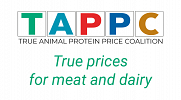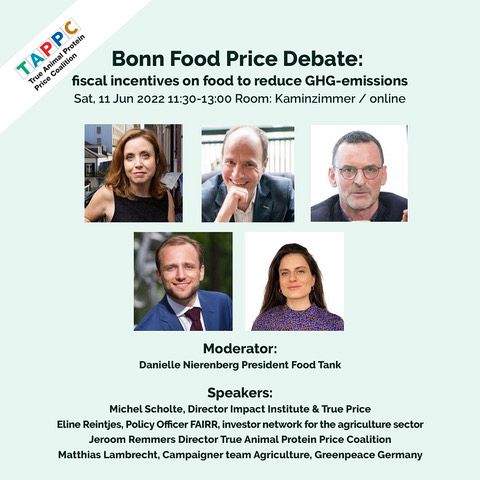TAPP Coalition side event 'Food Price Debate' during UN Climate Conference Bonn
During the UN Climate Conference in Bonn (6-16th June), TAPP Coalition organised the 'Bonn Food Price Debate' last Saturday in Bonn, to discuss fiscal options for food and agriculture to reduce greenhouse gas emissions. 37% of all global greenhouse gas emissions are linked to the food system, but fiscal incentives to reduce these emissions are lacking, in contrast to the energy sector (CO2 taxes and Emission Trading Schemes etc.).
The event can be seen here (starting at minute 16.10): https://www.youtube.com/watch?v=XcOFv0QJRQk&t=974s
Speakers during the event were:
Danielle Nierenberg, President Food Tank (moderator)
Eline Reintjes, Policy officer FAIRR (investor network agriculture sector)
Michel Scholte, Director True Price & Impact Institute
Matthias Lambrecht, agriculture team Greenpeace Germany (absent due to covid)
Jeroom Remmers, Director True Animal Protein Price Coalition (TAPP)
During the event, FAIRR announced a call from their investors calling on the FAO to deliver a clear roadmap for the Agriculture, Forestry and Other Land Use (AFOLU) sector to a sustainable global food system by 2050. https://www.fairr.org/article/roadmap-to-2050/ A central roadmap with key milestones can help investors align portfolios and engage with portfolio companies to minimise environmental impacts and exposure to climate and biodiversity risk. It should be clear to companies and other stakeholders in the sector, what volume of emissions must be mitigated to limit warming to 1.5°C, and the role each subsector must play in this mitigation. The International Energy Agency’s Net Zero roadmap has proven invaluable in demonstrating the pathway for the energy sector, and a similar pathway is now needed for agriculture.
During the event, TAPP Coalition presented its policy proposal for a 'true price on meat' , 40% higher compared to retail prices, including external environmental costs. Tax revenues can be used to finance farmers if they increase sustainability and animal welfare standards, but also to reduce prices for healthy food and compensate low income groups. TAPP also presented a new initiative for a Sustainable Food Pledge that can be signed by governments if they can show real commitments for policies to reduce food and farm related greenhouse gas emissions. . TAPP Coalition analysed that 9 countries, including Germany, Netherlands, New Zealand and China would be able to sign the Pledge. https://futurefoodprice.org/sustainablefoodpledge
Michel Scholte presented its calculations on true pricing of food and gave an update of true pricing food initiatives, mainly in the Netherlands. Organic supermarkets started to ask consumers a true price for food products and revenues increased although food prices went up: https://www.newyorker.com/business/currency/how-much-do-things-really-cost
Matthias Lambrecht was planning to present a report commissioned by Greenpeace Germany on VAT reforms for food, asking for a zero % VAT rate for vegetables, fruit, cereals and bread and a high VAT rate for meat and dairy and eggs. in this way, consumers will have a net benefit financially in some EU countries like Germany, Netherlands, Belgium, Poland and Austria. https://www.greenpeace.de/publikationen/Greenpeace_Analysis_of_VAT_rates_for_animal_and_plant_products.pdf
The German Environmental Ministry replied to this report last week with a report announcing a 0% VAT on vegetables, fruits and cereals on short term and a high VAT rate of 19% in stead of 7% for meat and dairy: https://www.umweltbundesamt.de/presse/pressemitteilungen/mehrwertsteuer-oekologisch-sozial-gestalten.


